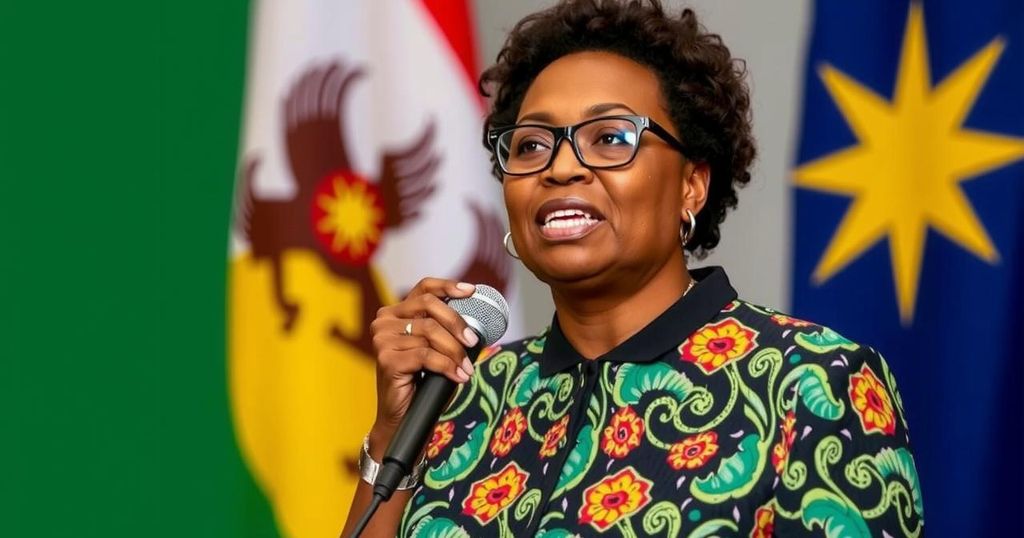World news
AFRICA, BOTSWANA, DEMOCRACY, ELECTIONS, ELECTORAL COMMISSION OF NAMIBIA, EUROPE, GERMANY, GOVERNANCE, GOVERNMENT, HA, INDEPENDENCE MOVEMENT, INDEPENDENT PATRIOTS FOR CHANGE, NAMIBIA, NANDI - NDAITWAH, NET, PAN, PANDULENI ITULA, PARLIAMENTARY SEATS, POLITICAL DYNASTY, SOUTH AFRICA, SWAPO, VP, WINDHOEK
Fatima Khan
0 Comments
Namibia Elects Its First Female President Amid Election Disputes
Namibia has elected Vice President Netumbo Nandi-Ndaitwah as its first female president, securing 57% of the vote in the recent election. Despite this significant achievement, opposition parties have raised concerns regarding the election’s fairness due to technical difficulties and discrepancies in the voting process. The ruling SWAPO party retains power amidst ongoing disputes and plans for legal challenges by opposition groups.
Namibia has made history by electing its first female president, with Vice President Netumbo Nandi-Ndaitwah emerging victorious in the recent presidential election conducted by the ruling SWAPO party. Nandi-Ndaitwah, aged 72, secured 57% of the votes, exceeding expectations that indicated a potential runoff might be necessary. This election marks a continuation of the SWAPO party’s dominance, which has held power for 34 years since Namibia’s independence in 1990. Despite these official results, opposition parties have expressed their dissatisfaction, citing various technical issues that they claim hindered a fair voting process, leading to plans to contest the election results legally.
The presidential election took place amidst significant scrutiny, particularly regarding technical challenges such as ballot paper shortages that necessitated an extension of voting until the following Saturday. Opposition parties, including the Independent Patriots for Change, have rejected the integrity of the election process, stating that numerous Namibians were deprived of their right to vote. Panduleni Itula, the leader of the opposition party, garnered 25% of the vote, resulting in his party achieving the second-largest seat share in Parliament.
Nandi-Ndaitwah’s political journey includes participation in the independence movement in the 1970s, which played a crucial role in Namibia’s liberation from apartheid South Africa. Her recent ascension to the presidency comes after the passing of President Hage Geingob while in office. In her victory announcement, the SWAPO party proclaimed, “SWAPO Wins. Netumbo Wins. Namibia Wins. Now Hard Work,” signifying their commitment to continue serving the nation. The opposition’s boycott of the results announcement only adds to the contentious atmosphere surrounding this election.
Beyond this election, Namibia stands as a large yet sparsely populated nation on Africa’s southwest coast, recognized for its relative stability as a democracy. This election’s outcome has significant implications for the country’s political landscape, especially given the mood of change affecting neighboring countries, with some long-ruling parties facing declines in support.
The recent election in Namibia is notable not only for the election of the first female president but also for the political climate shaped by the long-standing SWAPO party’s governance since independence in 1990. Following President Hage Geingob’s death earlier this year, Vice President Netumbo Nandi-Ndaitwah’s election symbolizes both continuity and potential progress within the nation’s leadership. Namibia’s history characterized by its struggle for independence plays a critical role in understanding the political dynamics at play, particularly as opposition parties claim electoral malpractices. The technical issues experienced during the election process have raised significant questions regarding the credibility of the Electoral Commission of Namibia and have impacted citizens’ perceptions of the electoral system. Amidst this backdrop, Namibia continues to navigate its path as one of Africa’s stable democracies, striving to uphold democratic values while addressing opposition grievances and ensuring inclusive governance.
In summary, Namibia’s election of its first female leader, Vice President Netumbo Nandi-Ndaitwah, marks a significant historical milestone for the nation. Despite this achievement, the election results have been overshadowed by allegations from opposition parties regarding the integrity of the electoral process, which could lead to legal challenges. As Namibia continues to grapple with its democratic processes, the political landscape remains crucial for fostering inclusive governance and addressing citizen concerns. The electoral outcome reflects both the enduring strength of SWAPO and the contentious nature of current political sentiments in the country.
Original Source: abcnews.go.com




Post Comment